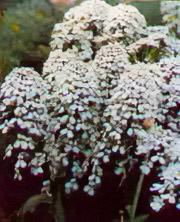Clay is difficult to dig through with a shovel, as it is sticky and compact. To make the clay soft so you aren’t working as hard, take floor or car wax and rub a light coat on the surface of the shovel using a clean cloth, then buff the surface. The wax will prevent any rusting, and the shovel will cut through the soil with great ease.
More people are turning to organic horticulture as a hobby and a way to get food. Read this article to find out what you need to do to get started. Just use these ideas and follow through with them.
There are home solutions available to combat the powdery mildew you may find on your plants. All it takes is a liquid soap, water, and baking soda mixture. Spray this mix on your plants every week and the mildew should go away. Baking soda treats the mildew effectively and gently and it won’t damage your plants.
Your plants need to adapt and must be gradually introduced to changes in temperature or condition. On the first day, put them out in sunlight for about an hour or so. Over a period of several days, slowly increase the time they are allowed to stay outside. After a week’s time, the plants should be fine staying outside.
Make sure your soil is healthy enough before you start planting anything. Have a soil report done. It is cost effective and you can make necessary adjustments, based on the report, to your soil so it is correctly enriched to encourage plant growth. Many Cooperative Extension offices will provide this service, and it is well worth knowing exactly what the soil needs to avoid ruining a crop or two.
Choose perennials that slugs are not attracted to. Slugs or snails can kill a plant very quickly. They often enjoy feeding on perennials with very smooth and tender leaves. Young plants are a special favorite of theirs. There are some perennials that do not appeal to slugs, such as those with leaves that are hairy and tough with a bad taste. Selecting an unappetizing perennial, such as campanula or heuchera, will help stop them from being eaten.
Make sure to pre-soak seeds, preferably in a dark location. Place a couple of seeds in a tiny container, and fill it with water nearly to the top. This will keep seeds hydrated and help them to grow faster. This improves the chances of successful plant development.
Cover fences and walls with lots of climbers. Climbing plants are known to be very versatile, and can help hide any ugly wall or fence, and this often only takes one growing season. You may also be interested in training them over an arbor or trellis. You can also grow them among existing landscape trees and plants. Some climbers will attach themselves to a support using twining stems or tendrils, while other varieties need to be held up by tying them in place. If you’re looking for the most reliable varieties available, choose from clematis, wisteria, and climbing roses.
Preparing a plot for planting a perennial garden can be done quickly and without difficulty. Use a spade to dig up some soil, flip the soil over, and finally, sprinkle around 3-4 inches of wood chips on the soil. Allow the newly turned soil to sit for two weeks, then plant your perennials.
When winter arrives, transfer a few plants into the house for safe storage during the cold weather. You may be able to save your most resistant or expensive plants. Dig carefully around their roots and place them into a pot.
Have your gardening tools near you to minimize the time spent searching for them. Keep the tools in a big bucket, or store them in strong pockets in your pants. Keep gloves, small pruning shears, a trowel and any other tools handy in order to increase the quickness of the work that goes into your garden.
As you are now well aware, cultivating the perfect organic garden requires patience, effort and time. Take the information contained above as an example. If you can use these tips to your advantage, you can take the guess work out of an otherwise complicated venture. You will find that organic horticulture is an ideal approach for growing vegetables, flowers and grasses.
Get the most value from your property. Landscaping has one of the highest returns you can get from home improvement. There are some varieties of plants that increase property values by over 20%. Seek out plants and shrubbery that require limited maintenance and will adapt well to the natural climate that you live in.
